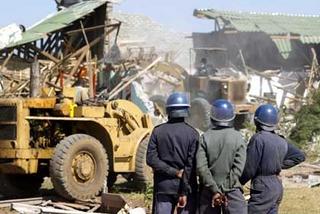
Off at a slight tangent. I attended a lunch today organized by the International Policy Network, the think-tank that produces more ideas that could actually help developing countries than Gordon Brown tax rises.
The guest was Geoff Hill, a journalist of many years’ standing, who worked in Zimbabwe until he had to leave the country, writes now for the Washington Times, and spends much time in southern Africa.
He was talking of his just published book, What Happens After Mugabe? (I understand the book trade refers to it as WHAM, so it is difficult to work out which section of any bookshop it might end up in.)
The book consists of various interviews and discussions among the huge and ever-growing diaspora of Zimbabweans but the talk was on Mr Hill’s ideas of what ought to be done now in order to ensure that when Mugabe disappears off the scene, by whatever method, the country can have a relatively smooth transition.
Of course, years of bloody oppression do not a smooth transition make and there are many people who are determined that those who have imprisoned, tortured and murdered should be punished. It was not clear whether the general feeling was that the punishment should be administered by a future Zimbabwean court or by the International Human Rights one. Both are fraught with difficulty and the South African Commission for Truth and Reconciliation does not exactly fill one with hope.
Over and above that, Mr Hill insisted, preparations must be made now for the reconstruction of the country. And that is precisely what the western countries and the international community are not doing.
The UN – to start at the top – has never been able to pass a single resolution about Zimbabwe, blocked as they were each time by other African countries. The Commonwealth, which, for some reason Mr Hill thinks, is now doing a good job in restraining tyrannies, has, in fact, been hampered by the same problem. South Africa, the “the points man”, has rather belatedly shown some disapprobation of Mugabe’s behaviour but, by and large, Thabo Mbeki has not been much help.
The EU has passed various resolutions and imposed the odd sanction, also proceeded to break every one of them, whenever President Chirac or whoever wanted to strut around at a pan-African conference.
The United States has, more or less, decided that on this one they will act at several removes – the removes being Britain and the EU. And Britain? What of the country that will probably end up paying a large proportion of the aid? Well, the government has made its views known. Unable to expel people who are openly calling for murder and mayhem in this country and others, it has insisted that Zimbabweans who have asked for asylum on the grounds that they have already been persecuted and tortured and will be again, if they go back, should, nevertheless, be sent back. A High Court case has started today.
Throughout the farce and horror outlined above, Zimbabwe continued to receive aid that was immediately stolen by Mugabe, his wife and other friends and relations.
But does anyone have any plans for the resuscitation of the country if and when Mugabe should die (and he is 82)? Well, … errm … it seems not. The State Department has no plans; the FCO has no plans; the NGOs do not wish to spend money on anything like that, when there are conferences and other freebies to be had for themselves.
It seems that somebody has thought of compiling a database of the whereabouts of educated and qualified Zimbabweans so these people can be invited or induced to return, should circumstances change. The NGOs thought it was a great idea. Would they be able to come up with $50,000 to start the database. Well, errm, the budget is a bit tight at the moment, old boy. No need to rush into things. Come back when it is all happening.
One could re-establish record of land ownership, which was kept reasonably well until 2000. One could start training police officers – surely something the Commonwealth could organize. There is a need for a Zimabwean community radio station in South Africa that would serve as a rallying point and a training ground for replacement journalists, radio being much more important than print in most African countries.
And so on, and so on. It was painful to listen to the catalogue of ideas that were met with sympathetic sighs and blank faces in the various official organizations, particularly as one thinks of the amount of money that has been spent on useless aid projects. Would Bob Geldof consider taking the cause up? I don’t think so. There is not enough publicity in it. Would Kate Moss click her fingers again? Woops, sorry, forgot, she is in a bit of trouble herself at the moment. Well, not trouble exactly, but you know what I mean.
But then, let’s face it: preparation for the future does not come very high on any political list of priorities, unless it is preparation for comfortable billets.
COMMENT THREAD
No comments:
Post a Comment
Note: only a member of this blog may post a comment.